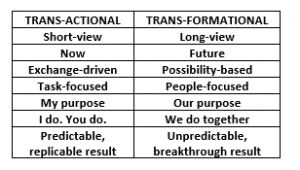We ask others to do things for us all the time – things we don’t want to do, things we don’t have the time to do, and things we couldn’t do even if we had the time. We drop our suits at the dry cleaners, our car at the garage, and our kids at school. These “drop-off” relationships, in a “drop-off” setting, produce appropriate, predictable results and are useful and needed. If the “drop-off” relationships creep into the work environment, they can severely limit collaboration, information sharing, trust and results. And no one wants that.
Leaders committed to creating a culture of engagement generated by everyone do so by being effective delegators. Being an effective delegator means having transformational relationships that create opportunities for people to grow.
TransACTional relationships Our interactions with the barista, the mechanic, the shop owner are transactional. They might be defined as conversations of exchange: “Hello, Barista, latte, please. Thank you.” The primary focus of a transactional relationship is the performance of a task, not a relationship with the task-doer. Both parties have little interest or need to build a deeper relationship. Collaboration, innovation, and deep trust are not required. When a transactional task is completed so is the relationship, at least until the next time the task is initiated. There’s nothing wrong with transactional relationships. They are useful, needed and entirely appropriate in the right setting (context).
TransFORMational relationships

Qualities that are not required in a transactional relationship — collaboration, deep trust, alignment, adaptability, honest conflict — are essential in a transformational relationship. Now let’s connect these dots to delegation.
Dropping-off is NOT delegating
“To commit powers to another as an agent to carry out powers and function.” The “to commit powers to” is the portion that distinguishes dropping-off from delegating. To see the power and possibility of authentic, development-focused delegation, I make two distinctions:
- The people to whom we’re dropping off already have the skill to perform the specific task.
- A person can’t be delegated the accountabilities of the role they already hold.
Both parties develop.
Delegation is an intentional, conscious act of giving someone the power and support to do something that they are not already responsible for. It’s easy to see the opportunity for the person receiving the delegation. But consider this: Delegation is a developmental opportunity for the delegator, too.
To effectively delegate, a person has to be untethered by the conversations that often limit delegation and thus development: It’s easier for me to do it. It takes too long to explain what I want. I don’t think they’ll do it right. I’ll have to do it over anyway. Clearly, these views promote protecting the status quo and fly in the face of an adaptive, collaborative work environment.
6 Steps for Effective Delegation

- Be clear on your commitment to create a developmental process.
- Share your commitment. Tell the person why you chose them, what development opportunities you see; ask them what opportunities they see.
- Give them the whole task. If you can’t give them the whole task, give them the whole picture so they can see how their part contributes to the whole.
- Create a structure for success: Specify what success looks like. If there’s a “how to” do something that is relevant, tell them. Establish what you need to know and by when. Offer support. Ask what support they need; provide it. Be available.
- At the end of the delegation: Debrief what was learned by both parties. Acknowledge effort; identify results; identify what worked and what didn’t.
Effective delegation requires more time than dropping-off with, at the foundation, a commitment to the person’s success. In a phrase, effective delegation is a leadership move. Your move.
Subscribe
Get Camille's latest posts!
